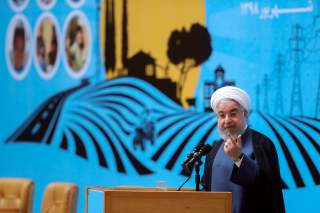Why America Must Confront Power-Hungry Iran
Dealing with Iran’s aggression is a zero-sum game. There is no middle ground where both free nations led by Washington and the Iranian regime can find a win.
With each passing week, Iran’s strategy comes into sharper focus: harass the international community and try to sow concern in energy markets without taking action that would prompt a kinetic response.
Iran is a radical force, the world’s leading state sponsor of terrorism, and a cheat that counts on weak-kneed countries to give in to extortion. Regime leaders are trying to project strength, but their strategy is resulting in just the opposite.
Iran looks small. It has been illegally boarding ships transiting international waters and seizing them for political, diplomatic, or financial ransom. That’s the same tactic that Somali pirates have been perpetrating for years before an international naval task force put an end to their operations.
Some may argue that U.S. energy dominance precludes the need for U.S. presence in the region. But they’re wrong. A multilateral effort to deter further illegal behavior must be led by the United States because freedom of navigation, geopolitical primacy, and stable energy markets are core components of U.S. national security. Iran’s behavior imperils all.
Few things are as important to U.S. national security as freedom of navigation. President Donald Trump understands that, which is why he has repeatedly dispatched U.S. Navy ships to the South China Sea and the Taiwan Strait, where Beijing has raised eyebrows with territorial claims and activities that challenge the global order.
Similarly, if the United States does not lead this effort, it sends the signal to illiberal states that America’s policies are not universal. The effects would be severe and long-term.
China and Russia will rush to fill the vacuum of leadership, which will benefit their partner—Iran—and make the world less safe. Our allies in the region, like Israel, would be vulnerable due to Washington lacking the resolve to lead. The U.S. intelligence community warned in the latest Worldwide Threat Assessment that Beijing and Moscow are involved in a “race for technological and military superiority” and “are more aligned than at any point since the mid-1950s.” U.S. absence from the region would act as a force multiplier for Chinese and Russian ambitions.
Oil and gas markets would likewise be subject to sudden shock. President Trump and his team know that a U.S.-led effort would keep energy markets stable and secure, resulting in a net positive for the U.S. economy, consumers and businesses alike. And they also know that eliminating the threat of a disruption that could roil markets would free investment for U.S. energy companies to continue growing our share of the global energy markets.
We are buoyed by recent reports that the Trump administration is accelerating plans for a military coalition to safeguard waters off of Iran and Yemen but the situation is deteriorating quickly. A president known for decisiveness must exercise that muscle now.
Allies like Bahrain are doing what they can to counter Iranian threats in the Gulf by organizing a global maritime security conference this fall, but if we wait until then to act, it may be too late. Similarly, President Trump should work with the United Kingdom, which recently joined the coalition, to recruit additional European membership. Iran shouldn’t be able to use the Joint Comprehensive Plan of Action (JCPOA) to shatter transatlantic unity.
America does not seek to confront Iran, but it cannot shirk its responsibilities to protect its national interests. Standing up to what amounts to guerilla tactics requires the resolve of the world’s most powerful naval force and U.S. allies must line up beside it, shoulder to shoulder, to thwart aggression from Tehran.
Iran is a nation that craves power and the ability to impose fear. America and its allies must combat Iran’s ability to achieve either. Because when the regime is not restrained, their malign intentions come closer to being fully realized and America cedes ground. Dealing with Iran’s aggression is a zero-sum game. There is no middle ground where both free nations led by Washington and the Iranian regime can find a win. Tehran must be disabused of its intentions to continue violating international law and it must happen now, before a mistake happens and lives are lost.
Mark D. Wallace, a former U.S. ambassador to the United Nations for management and reform, is chief executive of United Against Nuclear Iran. Fred Zeidman is a chairman of the Council for a Secure America. He is on the board of the Republican Jewish Coalition and is the chairman emeritus of the United States Holocaust Memorial Museum.
Image: Reuters

